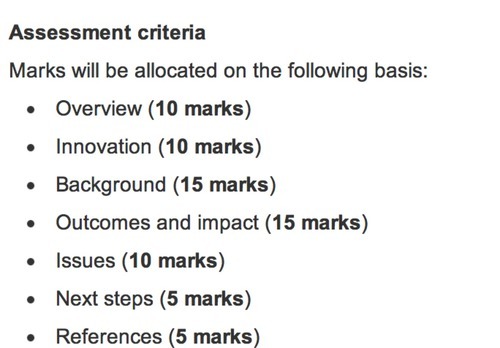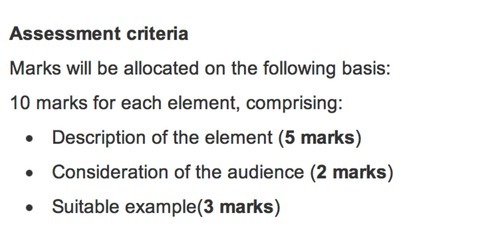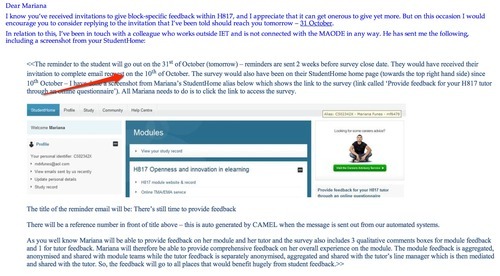When I started DS106 and this blog, I heard somebody advising a participant that if he was frustrated by the way a large corporation had treated him, then he should just ‘DS106 it!’. I remember thinking it was interesting to advise the use of creativity to work through frustration. DS106 as art therapy. I have since learnt that it also means DS106 as political activism, as there are many examples in the community of producing art as a way to make political or social critique.
Life has thrown me a lemon in the form of the systems and procedures of the Open University (OU) which have led to me formally withdrawing from their Masters on Online and Distance Education (MAODE) and requesting that all my personal data held behind their registration wall be deleted. I filed a generic email under ‘appeals and complaints’ – which will probably only give me yet another automated email as a response – after 3 months of trying very hard to hold a reasonable conversation with those responsible for the module and the Master as a whole. All to no avail. The trail ended with an anonymous feedback form with a set of assumptions that will lead to my tutor being held responsible for the issues I have had, rather than a review of the systems and procedures of an educational institution that in the name of fairness is running a Masters programme teaching students critical thinking by numbers.
The rest of this post offers the feedback I was unable to offer confidentially.
MAODE has several modules one of which is the Openness and Innovation module (#H817). At the end of the module it asks its students for the following in order to assess that they have reached the apropriate standards:

and a further 10% is broken down as follows:

Am I the only one seeing the irony in this assessment procedure? This is a Masters programme. This is a module that teaches openness and innovative approaches to learning. However, in signing up I knew that I would have to adapt.
I understood that if I wanted to continue with the course then I would need to adjust to this way of learning. When asked, I said that whilst I was enjoying what I was learning, I was not enjoying how I was learning it. The module has numerous pedagogical issues that I will not be discussing here, but I did want to discuss with faculty. I asked my tutor, she referred me to the head of the module, the head of the module referred me to the director of the programme, the director of the programme sent me the link to the anonymous feedback form.
I need to say that I have always had very idealistic notions about the OU and how it opens up education to all. This was my first real experience with it, and I must admit to being shocked by the reductionistic and disposable assignment nature of its pedagogical approach. In completing my first module with them, I kept making allowances for the shortcomings and doing my best to offer feedback and to attempt to navigate the constraints whilst looking for my learning needs to be met. I contacted one of the OU tutors, who has been an exemplary role model of open education, Paige Cuffe.
@paigecuffe thanks Paige. Want to offer feedback on modules. Also – I do not want 2 do compulsory one. I don’t need it, want 2 do others.
— Mariana Funes (@mdvfunes)
She was supportive of my intentions:
@mdvfunes worth talking to them – just taking control of your learning…
— paige cuffe (@paigecuffe)
I failed in my good natured attempts to offer feedback beyond anonymous surveys. I was frustrated beyond my levels of tolerance by the ‘closed-due-lack-of-interest’ approach my requests for dialogue met.
I was even accused of not being polite enough, as I got close to my third month and 5th person asking for a phone or face to face conversation to discuss my learning needs and offer feedback:
Thanks, Mariana, for your comments. However, you have strayed beyond the reasonable (and the polite) when you write:
“It is really not great practice to keep passing unhappy customers on to other members of faculty to get them out of your inbox.”
I was pointing you to the person who is in the best position to take account of your feedback.
I had only one option left and I chose not to take it. I could have contacted the one person that had made this #817 Open University module worth doing, Martin Weller. Martin, like Paige, is an exemplar open scholar. Engaging on the open web, sharing resources and certainly not trying to pass on OU students, or anyone else for that matter, so at to clear his inbox. He has always been helpful, he ran my first MOOC and opened my eyes to what adult education using the open web could really be like beyond the walled garden of the LMS. Yes, I could have contacted him and he would have listened. But it is not his job to deal with unhappy OU students. Particularly, when he works so hard at giving the OU a positive profile. This is why I chose to go through the appropriate channels. How should the OU have responded? Not the way it did in my view.
In my view, the right thing would have been for the head of H817 or the director of the Masters I was enrolled in to do me the courtesy of listening. I am, after all, paying two thousand five hundred pounds sterling for the privilege of being taught on the module. I have rights. Of course, if I were invested in getting yet another postgraduate degree I would not feel quite so free to challenge the powers that be. Those very people who control the pass/fail levers. Thankfully, I already have as many degrees as I need, and a reputation in my field as a chartered research psychologist specialising in adult learning. I do not need another degree.
I wanted to engage in dialogue as equal partners with the Open University faculty. I was, instead, treated as a nuisance and forced to make the choice to withdraw from a course I really wanted to complete just because I believe in the ideals of the Open University and wanted to be part of its community.
I have met wonderful people through H817open and through the closed LMS #H817. The community is not at fault. It is the systems and procedures of an institution that used to be at the leading edge, is now drowning in red tape and made up of silos that do not communicate with each other. I would have wanted to engage constructively with faculty to offer a view of one student’s experience and how their pedagogy may be affecting dropout rates. It was not to be. My final communication with the director of the Masters Programme after my repeated requests to talk, simply reminded me that I had been sent an email to give feedback and had not acted on it. It was clearly my fault that my feedback had not got into the system and may be a reminder would lead me to comply.

I did comply. I filled in the form, but the form is not designed for dialogue but for the same thing that all OU formal communications seems to be – ensuring that the organisation is not held responsible for any complaints. I lost track of the interactions I had that were not about engagement but about fault finding. I summed up my form filling experience in my last email to the director as follows:
It seemed appropriate [to fill in the form] to help future students and yourselves. Your form is biased and does not allow for a flexible and open feedback loop. The way the form is designed it will put the responsibility on my tutor for my discontent. This would be a mistake. She has struggled with the same things as I have: really trying to do a good job as procedures, systems and work conditions have conspired against her being able to deliver.
The module (H817) was not ready to be delivered and you have made your students pay for experimentation and refinements. I paid for access to library and faculty and all I got were excuses from the library and apologies from my tutor as she struggled with the system. The only faculty member that offered what I paid for was Martin Weller. Everyone else was absent beyond writing a Moodle book. It was only when students insisted on getting contact that we got 1 hangout to clarify a confused block and project. I was paying for more than that.
I close this post with the best example of the systemic pattern I encountered at the OU. I spent 6 months trying to get access to the library services I was paying for and failing. Unless references could be acquired directly online no support to speak of is available. A number of ignored emails later, I contacted my tutor and asked for help. She could not help me. She did, however, suggest I contacted their web chat service, as it was an efficient service.
If you have made it this far, make yourself a cup of tea and listen to my podcast ‘The Helpful web-chat librarian’. I could not make it up.
Good bye Open University, hello MOOC life!
World’s biggest MOOC enrolls 7.2 billion people– it’s called “Earth”
— Alan Levine (@cogdog)
Leave a Reply